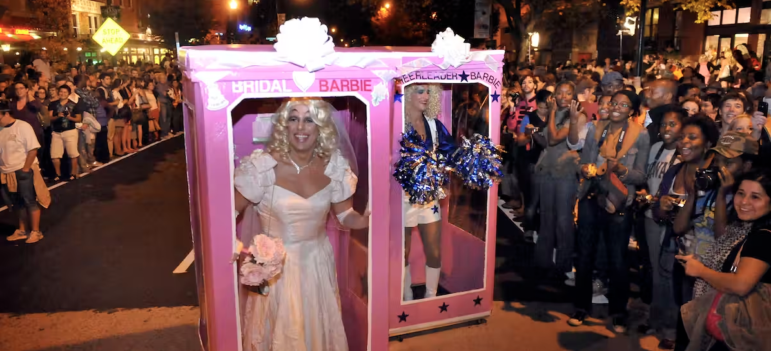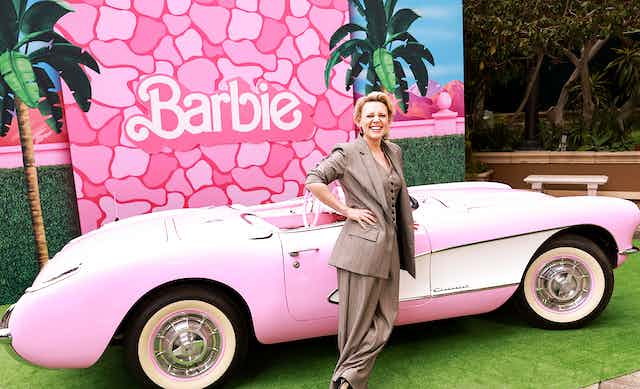As a mama trying to raise a daughter free from the gendered stereotypes of my own childhood, I steered her clear of Barbie dolls.
I felt compelled to nudge my now 11-year-old away from the Mattel mainstay for the same reasons I tried to avoid the shallow frivolity of all those Disney princesses waiting around to be rescued.
True, I’d enjoyed plenty of afternoons with these dolls of anatomically impossible proportions myself as a kid growing up in the 1980s – jamming those long spindly limbs into impossibly tiny outfits, scissoring them on mattresses fashioned from my mother’s maxi pads, staging epic domestic dramas. But by the time I was a teenager in the 1990s, I’d discovered feminism.
I’d later grow up to become a professor of feminist philosophy and the author of a book on feminism for the general public. Barbie’s hyperbolic blond femininity came to represent everything that was wrong with patriarchal beauty standards.
My perspective began to change when snippets of the “Barbie” movie trailer started insinuating themselves into my online feeds. Hot pink hot flashes of nostalgia merged with the realization that Barbie looks to be reinventing herself once again.
Barbie’s retrograde femininity
I think Barbie has long functioned as a proxy onto which cultural aspirations and anxieties about womanhood are projected.
The toy first hit the market in 1959. To earlier generations, as the first doll to encourage girls to aspire to anything other than motherhood, Barbie might have stood for the unapologetic ambitiousness of the independent career woman. But when it was my generation’s time to play with her, she’d long since been drained of anything so progressive.
Instead, there was the relentless whiteness of her ideal of beauty. The class-obliviousness of her McMansion Dreamhouse. Her protestations that “Math class is tough,” driving home the message that STEM is for boys and that girls should be more concerned with being pretty than being smart, or happy, or ambitious or interesting.
All this made Barbie an extremely convenient whipping girl for legitimate frustrations about the unfair expectations foisted onto women by a patriarchal society. Like many feminists, I came to believe that being taken seriously as a woman meant rejecting pretty much everything that Barbie stood for.
My ambivalence toward the kind of conventional femininity of which Barbie was the apotheosis came to feel like a central component of my identity. Sure, I might’ve felt naked if I’d left the house without wearing makeup and uncomfortably restrictive clothing. But I felt consistently guilty about the time and energy I let myself dump into such frivolous pursuits, and I made sure to hide as much of it as I could from my growing daughter.
If I was going to indulge in superficialities that felt completely at odds with my ideological commitments, at least I was going to protect her from internalizing the conviction that she needed to do the same.
No daughter of mine was going have her self-worth tied to the belief that she needs to be sexually appealing to men. So: no Barbies.
Femmephobia
Then the hype surrounding the movie strutted those perfectly arched plastic feet back into my consciousness, and I found myself reconsidering my long-standing aversion to Barbie’s performance of femininity. Why, I wondered, did she bring out such mean-girl energy in me?
Femmephobia refers to the dislike of, or hostility toward, people or qualities that are stereotypically feminine. It arises against a cultural backdrop in which femininity is consistently less valued than masculinity, and in which the traits associated with masculinity – rationality and independence – are considered to be normal or ideal for all people.
Meanwhile, qualities associated with femininity – such as emotional expressiveness and interdependence – are thought of as inferior, substandard or deviant. But it’s not as if feminine interests and pursuits are inherently more frivolous than masculine ones. Instead, it’s the very fact that something is coded as feminine that makes people take it less seriously.
“Fashion,” quips author Ruth Whippman, “is vain and shallow, while baseball is basically a branch of philosophy.” And Barbie’s defiantly bubbly femininity is about as unserious as it comes.
The trans feminist author Julia Serano argues that much of the discrimination faced by trans women has less to do with their being trans and more to do with their being willing to brazenly perform femininity.
The problem, in other words, is less about trans women transgressing conventional gender norms than about their picking the losing team.
“The fact that we identify and live as women, despite being born male and having inherited male privilege,” she writes, “challenges those in our society who wish to glorify maleness and masculinity.”
Today’s mainstream visibility of trans women has played an important role in advancing the cultural conversation about the respectability of femininity. Some anti-trans critics accuse the unapologetic femininity of trans women of entrenching retrograde stereotypes. Their femmephobia seems to prevent them from realizing that the objects of their scorn could be celebrating femininity, not denigrating it.
Is ‘Barbie’ feminist?
Mattel Films is shying away from calling the “Barbie” movie “feminist” – which is unsurprising, given the sometimes controversial label’s uncomfortable fit with corporate profit motives.
But the studio’s choice of Greta Gerwig to write and direct the film suggests a willingness to explore Barbie’s world through a political lens: Gerwig’s solid feminist credentials include her 2017 “Lady Bird” and her 2019 adaptation of “Little Women.” And the casting in “Barbie” of lesbian icon Kate McKinnon and trans model and actor Hari Nef is a clear nod to the LGBTQ+ community.
The feminist philosopher Judith Butler argues that gender isn’t some deeply rooted metaphysical fact; it’s something people perform via their mannerisms, clothing and behavior. Butler says everyone could stand to take a lesson from drag queens, who understand that there’s nothing fundamental behind the smoke and mirrors, nothing to gender above and beyond what the audience thinks of the show. In the words of RuPaul, perhaps the most famous drag queen of all: “You’re born naked, and the rest is drag.”
I think Gerwig’s “Barbie” gets that memo. The hyperbolic femininity of Margot Robbie’s portrayal of the iconic doll strikes me as tantalizingly closer to queer camp than as anything that’s supposed to be taken as a sincere role model.

Barbie in the zeitgeist
“Barbie” feels poised to tap into our current cultural moment, one in which conservative anti-feminist backlash is fueling the backsliding of generations of feminist gains. Meanwhile, LGBTQ+ people face unprecedented levels of both visibility and violence. The world’s having new cultural conversations about gender and sexuality.
Since coming out as queer several years ago, I have seen my relationship with my own femininity become considerably less fraught. Thanks in large part to the insights of feminists like Serano and Butler, I’m coming around to the recognition that performances of femininity can exist for purposes other than snagging a man.
I won’t pretend to have completely broken free from my decades of internalized femmephobia. But when “Barbie” gets to my local movie theater, you’d better believe that my daughter and I will be first in line.
Carol Hay is Professor of Philosophy at UMass Lowell
